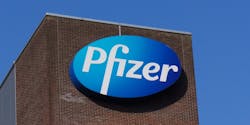Pfizer Finishes Phase 3 Trials and Applies for Emergency COVID Vaccine Authorization
Pfizer Inc. and BioNTech SE announced November 20 that they had finished Phase 3 trials of their COVID-19 vaccine and submitted an application for an emergency use authorization, or EUA, from the Food and Drug Administration.
According to the finished Phase 3 trials, Pfizer’s vaccine candidate is 95% effective at preventing COVID in patients without prior infections.
“Filing in the U.S. represents a critical milestone in our journey to deliver a COVID-19 vaccine to the world,” said Pfizer CEO Albert Bourla in a statement. “We now have a more complete picture of both the efficacy and safety profile of our vaccine, giving us confidence in its potential.”
If Pfizer’s EUA application is granted, it will become the first FDA-authorized mRNA-based vaccine, even if its use is only an emergency use authorization. Messenger RNA-based medicines have the potential to change how we vaccinate against diseases dramatically—for example, by allowing drugmakers to dramatically speed up the pace of vaccine development. Unlike traditional vaccines, mRNA-based drugs don’t have to rely on the cultivation of a pathogen in order to protect against it.
The report announcement comes about two weeks after Pfizer first published preliminary data on the effectiveness of its vaccine candidate and four days after Moderna Inc. published similar data on its own vaccine candidate. The numbers from Pfizer’s final study bring its vaccine candidate’s effectiveness more in line with the initial effectiveness figures from Moderna’s preliminary data release, which also showed 95% effectiveness.
One potential handicap in distributing the vaccines is already looming, though. Both Pfizer and Moderna’s vaccine candidates must be kept refrigerated for transport, according to the companies.
Pfizer, in a note related to European distribution of the vaccine, recommends that its own drug be kept between -80 and -60 degrees Celsius—or, in Fahrenheit, between -112 and -76 degrees.
In order to accommodate the deep freeze, Pfizer says it has developed special temperature-controlled shippers, which can maintain the storage conditions for 15 days if refilled with dry ice and include a GPS-enabled thermal sensor to keep tabs on each shipment’s temperature and location.
Juan Andres, Moderna’s Chief Technical Operations and Quality Officer, said in a November 16 statement that their vaccine can be stored for up to 6 months at -20°C (-4°F), which is about the temperature of a standard freezer, up to 30 days at 2 to 8 degrees Celsius (36 to 46 degrees Fahrenheit), and up to 12 hours at room temperature.
“We believe that our investments in mRNA delivery technology and manufacturing process development will allow us to store and ship our COVID-19 vaccine candidate at temperatures commonly found in readily available pharmaceutical freezers and refrigerators,” said Andres, saying that the vaccine’s long shelf life would enable simpler distribution and wider-scale vaccination.
About the Author
IW Staff
Find contact information for the IndustryWeek staff: Contact IndustryWeek
